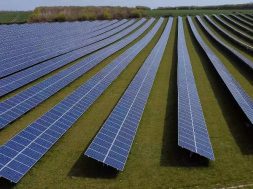
Center for High-Efficiency Solar Cells – Cornerstone laid for a new laboratory building at Fraunhofer ISE
For more than 30 years, the Fraunhofer Institute for Solar Energy Systems ISE has been one of the world’s leading research institutes for solar energy. In the field of photovoltaics, which focuses on converting sunlight into electrical energy, the institute has repeatedly set world records for efficiency for various solar cell technologies, thereby helping to put Germany at the forefront of international research and development in this area. In order to strengthen Germany’s leading position, the institute is now constructing a new building with a clean room equipped to handle the latest technological challenges. The cornerstone of the “Center for High-Efficiency Solar Cells” was laid on October 4, 2017 in Freiburg. By financing this building, the federal government and the government of Baden-Württemberg are signaling their commitment to photovoltaic research in Germany.

Visualization of the Center for High-Efficiency Solar Cells on the campus of the Fraunhofer Institute for Solar Energy Systems ISE on Berliner Allee.
At the forefront of German photovoltaic research
Over the past 15 years, the international market for photovoltaics has grown by more than 30 percent per year, with the costs of PV modules declining by more than 80 percent over the same period. Yet the potential for photovoltaics is far from exhausted. Research and industry are working hard to further improve efficiency and reduce the costs of solar cells, while also addressing aspects of sustainable production.
Germany remains a global leader in research and plant construction for photovoltaics, and Fraunhofer ISE has recently set several records for solar cell efficiencies: the world record for multicrystalline silicon solar cells at 22.3 percent efficiency, a 25.8 percent efficiency rate for a monocrystalline cell based on TOPCon technology, and – exceeding the limits of silicon as a material – 31.3 percent efficiency for a tandem solar cell comprising a III-V multi-junction solar cell on a silicon cell. With its III-V multi-junction concentrator solar cell, the institute also achieved the overall world record for photovoltaic efficiency at 46.1 percent.

Cornerstone laid for “Center for High-Efficiency Solar Cells” at Fraunhofer ISE. f.l.t.r.: Georg Brechensbauer, Brechensbauer Weinhart + Partner Architects, Prof. Alfred Gossner, Executive Board Fraunhofer-Gesellschaft, MinDirig Günther Leßnerkraus, Ministry for Economic Affairs, Labor and Housing, Baden-Württemberg, Prof. Margit Zacharias, Vice-President for Innovation and Technology Transfer, University of Freiburg, Prof. Stefan Glunz, Head of Division, Photovoltaics, Fraunhofer ISE, Prof. Hans-Martin Henning, Director Fraunhofer ISE, Dr. Andreas Bett, Director Fraunhofer ISE.
Adjusting infrastructure to meet challenges
Fraunhofer ISE’s new “Center for High-Efficiency Solar Cells” in Freiburg builds upon this solid foundation. It will include infrastructure to replace the outdated clean room for solar cell development and is also perfectly equipped for the next generation of solar cells. “We are delighted that in designing the new clean room facilities, we were able to adjust the infrastructure to meet the latest technological challenges,” says institute director Dr. Andreas Bett, adding: “We are grateful to the Federal Ministry of Education and Research (BMBF) and the Federal State of Baden-Württemberg for financing the new laboratory building. With their contributions, they are recognizing the importance of German research activities in the area of photovoltaics.” Prof. Hans-Martin Henning, the other institute director under Fraunhofer ISE’s new joint leadership system, stresses the prominent role that photovoltaics will play in a future sustainable energy system based on renewable energies: “When it comes to the cost-effective realization of the energy transition, our energy system analyses make clear that photovoltaics and wind energy will be the pillars of our future energy supply.”
Baden-Württemberg’s Minister of Economic Affairs, Labor and Housing, Dr. Nicole Hoffmeister-Kraut emphasized that with its work, Fraunhofer ISE is making a “major contribution to the affordability and success of the energy transition.” She also noted the institute’s international standing and excellent reputation in solar research. “The new Center for High-Efficiency Solar Cells is an important element in maintaining this position.”
The federal and state governments provided a total of 32.6 million euros for the “Center for High-Efficiency Solar Cells” project. Baden-Württemberg’s contribution also communicates its strength as a center for the photovoltaics industry.
The cornerstone of the “Center for High-Efficiency Solar Cells” was laid on October 4, 2017 on Berliner Allee in Freiburg. Construction is scheduled to be completed by the end of 2019.
Source: ise.fraunhofer.de












